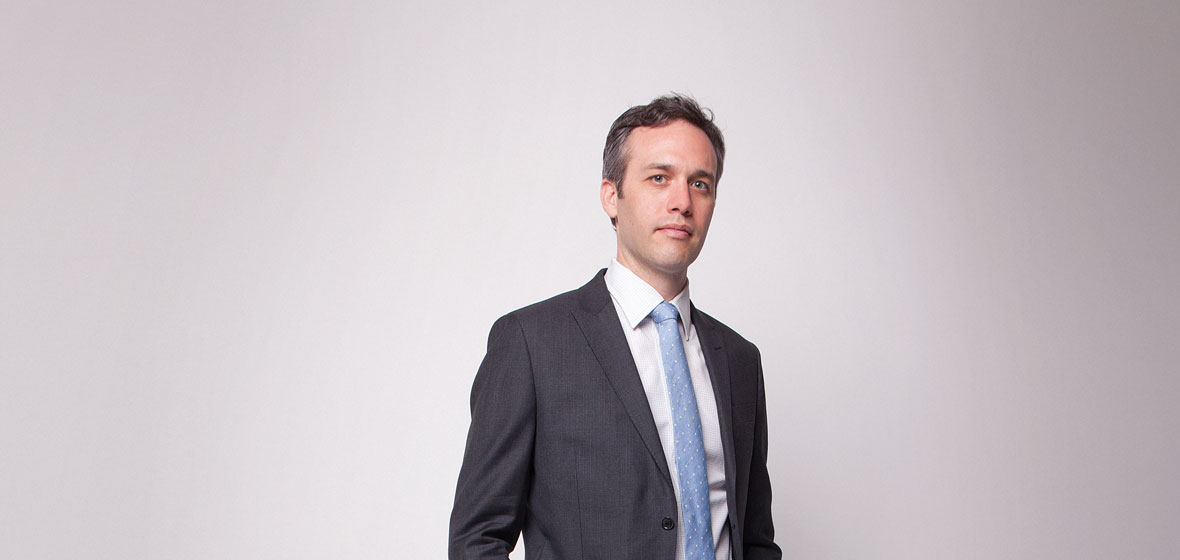More than 500 lawyers in NSW do voluntary work for the Public Interest Advocacy Centre (PIAC) – primarily for their Homeless Persons’ Legal Service – and many firms provide a range of support, including Allens, which makes their Indigenous Justice Program possible. Ed Santow, PIAC’s Chief Executive Officer talksabout the hallmarks of public interest law, the influences that shaped his career, and his new baby.
On the early morning when Ed Santow welcomes me to PIAC’s new premises overlooking Hyde Park and the section of Oxford Street where Mardi Gras starts each year, it is a time of new beginnings for this 36-year-old.
PIAC’s 30 staff members, a diverse mix of lawyers and policy professionals, have moved into the building two weeks before. The large boardroom where we sit to talk is squeaky clean and smells brand new.
Even more significantly, Santow and his wife, Liz, a policy adviser in the Department of Premier and Cabinet, have just had their first baby, a son, Rafael, who is 15 weeks old.
How is life with a new child and will Rafael change it much?
“It’s great. He’s kind of an all-smiling, all-feeding, rarely-sleeping delight,” Santow replies, laughing. “I think he will inevitably change our life. My wife has taken a year’s parental leave. The rhythm of life changes. He’s now a very, very powerful seven-kilo piece of ballast in our life and a central focus point. For someone who can’t talk, he’s quite wonderful company.”
Such a period of change is a perfect time to reflect on the work of PIAC and the factors that have shaped Santow’s life.
“PIAC is a social justice organisation,” he begins, with business-like precision and characteristic enthusiasm. “We’ve been around for a bit over 30 years and our fundamental role is to take difficult, wicked social problems and be really tenacious and try to work with the community and key decision-makers to solve these problems. We have a very broad brief and we can choose the areas we focus on.
“One thing that is almost unique and special about PIAC is that we are able to simultaneously adopt three strategies. The first is public interest litigation. The second is law reform and policy development. The third is education and training.
“To take an example, one of our most celebrated cases of the past two years was representing Graeme Innes, the then Disability Discrimination Commissioner, in his personal capacity, in a case against Sydney Trains.”
Innes is blind and catches the train to work each day, but Sydney Trains’ high failure rate for audible arrival announcements caused problems.
“The failure rate was about 20 per cent, which means if you commute to work each day, then twice a week you’re likely not to know where to get off the train if you are blind or have a vision impairment,” explains Santow.
“We initially thought, this is so much worse than any city that Sydney would compare itself to, that we would be able to resolve that problem using non-litigation advocacy. But it proved impossible. Only at that point did we pull the trigger, so to speak, and launch a test case. It was a very important case and ultimately we prevailed. (Innes v Rail Corporation of NSW (No 2) [2013] FMCA 36 (1 February 2013)
“We were then able to go back to Sydney Trains and work with them co-operatively and constructively to improve their processes. With the education and training dimension, there has been an enormous amount of work done with the guards in trains to improve the way they make announcements. This case illustrates the way we integrate our three strategies. We pull whatever lever is likely to have a positive result.”
[Mum] encouraged us to pursue things that benefit others and to imbue our working lives with meaning and not just chase after the biggest possible salary.
ED SANTOW,
CEO, PIAC
“The unusual thing about public interest litigation is that, in addition to fulfilling the duty to the client that all lawyers share, we also have an interest in promoting something that will help people who are in a similar position to the client,” says Santow. “Public interest litigation goes beyond the individual client and is intended to have a broader impact. That’s the real hallmark of it.”
PIAC is working on a number of major projects, including police accountability in the use of tasers, and access to insurance for people with mental health issues. In both areas, test cases are likely.
PIAC receives its core funding from the NSW Public Purpose Fund, the interest on solicitors’ trust accounts, and also the state and federal governments. But Santow is keen to thank the legal profession and particularly the Law Society of NSW for the crucial support given to PIAC and its clients.
“We receive an enormous amount of support from the legal community and we’re very, very grateful,” he says. “In addition to support from a range of firms, the most generous of which is Allens, we have more than 500 lawyers who volunteer with us.
“Most of the volunteers work with our Homeless Persons’ Legal Service, which is a free service for those who are homeless or at risk of homelessness. We partner with law firms, Legal Aid NSW and a large number of welfare agencies. We train and support those lawyers to go to agencies such as St Vincent de Paul and the Salvation Army, where homeless people are, and we give them an opportunity to sort out their legal problems.”
When the conversation turns to the people who have influenced his life, Santow’s mum and dad are front and centre. “I had a very happy childhood,” he says. “I had a really lovely, middle-class background. My dad, Kim Santow, was a lawyer at Freehills for more than 30 years and was a judge. He was on the NSW Supreme Court and then the NSW Court of Appeal. He was a wonderful influence on me. He certainly never encouraged us to be a lawyers.
“My brother, Simon, is a journalist at the ABC and William is in business. I am the only lawyer. But dad was an incredible enthusiast. What he really encouraged us to do is find things we were passionate about and to pursue them zealously. To foster and channel passion is a really good thing a parent can do.”
Santow’s mother, Lee, has had just as big an influence on his career.
“She spent the vast majority of her working life as a social worker,” he explains. “If you are a lawyer who works in social justice, the values and principles of social work resonate really strongly. They certainly do with me. Mum encouraged us to pursue things that benefit others and to be passionate, but also to imbue our working lives with meaning and not just chase after the biggest possible salary.”
Santow attended the selective independent school Sydney Grammar, as his father did.
“There were two particular things at Sydney Grammar that came through very strongly,” he says. “The first was that we were encouraged to pursue excellence. It could be academic excellence, creative writing, music, sport or debating.
Santow emphasises that, for numerous reasons, litigation is a last resort.
“It is a very unwieldy tool for bringing social change,” he explains. “It needs to be deployed by people who are experts, it asks an enormous amount of the litigant and the outcomes are uncertain. I think Graeme was incredibly selfless. He saw this as an issue that affected him but he was probably more motivated to help the many other people like him. In Australia we have about 350,000 people who are blind or have a vision impairment. They simply can’t participate properly in daily life and in the economy unless we have a structure that accommodates their basic needs.”
The Innes case also illustrates the hallmark of public interest law.
That, in a sense, wasn’t important. But to pursue something and really test yourself, that was a really important principle. The second thing was a kind of pluralism. The students had diverse backgrounds because of the scholarship program and there were many kids whose parents made huge sacrifices to send them there.”
At the University of Sydney, where Santow studied Arts/Law, he encountered Professor Les McCrimmon, who taught advocacy and litigation.
“He never taught me, but he had a particular interest in social justice,” Santow says. “He introduced me to the Global Alliance for Justice Education and, in 2001, took myself and other students to a conference in South Africa that was looking at the HIV and AIDS crisis from a legal perspective. It showed me that, as a lawyer, you could get beyond the dusty bookshelves and do some really practical work that can address social problems. He later supervised me at the Australian Law Reform Commission and he now practises in the Northern Territory.”
In Australia we have about 350,000 people who are blind or have a vision impairment. They simply can’t participate properly in daily life and in the economy unless we have a structure that accommodates their basic needs.
ED SANTOW,
CEO, PIAC
Santow did his post-graduate Masters of Law focusing on public law and human rights at Cambridge, where he met Professor David Feldman, another significant influence. Santow describes him as “an eccentric man in the true English tradition and one of the world’s leading experts on human rights and comparative constitutional law. He had the instinct to make people think independently and he forced people to think beyond the narrow confines of their minds”.
Santow applied these principles during his own stint in academic work. He spent a number of years at UNSW teaching core subjects, such as administrative law, constitutional law and public law.
“I tried to imbue a sense of the value in legal practice of independent thinking and the value of respecting human rights, because that’s likely to be enduring in the memories of the law students,” he says.
Santow describes working for the firm (now called) King & Wood Mallesons as “my first proper legal job” and it was there he met another person who shaped his career.
“It was a great job. I learnt an enormous amount,” he says.
“One of the partners I worked for in particular was hugely influential: Julie Ward, now Justice Ward on the NSW Court of Appeal. She is a formidable intellect, one of the absolute top litigators of her time, with exacting standards, both to the other side but also to the lawyers who worked for her. At the same time, she was a fiercely warm and incredibly nurturing figure. That combination can bring out the absolute best in people.”
In 2008, The Sydney Morning Herald obituary for Santow’s father, Kim, reported that, at his swearing-in to the Supreme Court of NSW, he referred to a story from Vikram Seth’s A Suitable Boy about a reluctant candidate for the bench who refused all pleas to accept the post until he was moved by the simple words of his former law clerk: “Do you not want to do justice?”
Santow clearly wants to “do justice”, too. As he begins his new role as a father, he will be very happy indeed if he and his wife can imbue in their son the same passion for justice as has been passed down through the generations so successfully.




